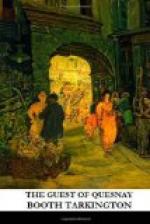Again taking me for her neighbour at the table, Miss Elizabeth talked to me at intervals, apparently having nothing, just then, to make up to Mr. Cresson Ingle, but not long after we rose she accompanied him upon some excursion of an indefinite nature, which led her from my sight. Thus, the others making off to cards indoors and what not, I was left to the perusal of the eighteenth century facade of the chateau, one of the most competent restorations in that part of France, and of the liveliest interest to the student or practitioner of architecture.
Mrs. Harman had not appeared at all, having gone to call upon some one at Dives, I was told, and a servant informing me (on inquiry) that Miss Elliott had retired to her room, I was thrust upon my own devices indeed, a condition already closely associated in my mind with this picturesque spot. The likeliest of my devices—or, at least, the one I hit upon—was in the nature of an unostentatious retreat.
I went home.
However, as the day was spoiled for work, I chose a roundabout way, in fact the longest, and took the high-road to Dives, but neither the road nor the town itself (when I passed through it) rewarded my vague hope that I might meet Mrs. Harman, and I strode the long miles in considerable disgruntlement, for it was largely in that hope that I had gone to Quesnay. It put me in no merrier mood to find Miss Elizabeth’s phaeton standing outside the inn in charge of a groom, for my vanity encouraged the supposition that she had come out of a fear that my unceremonious departure from Quesnay might have indicated that I was “hurt,” or considered myself neglected; and I dreaded having to make explanations.
My apprehensions were unfounded; it was not Miss Elizabeth who had come in the phaeton, though a lady from Quesnay did prove to be the occupant— the sole occupant—of the courtyard. At sight of her I halted stock-still under the archway.
There she sat, a sketch-book on a green table beside her and a board in her lap, brazenly painting—and a more blushless piece of assurance than Miss Anne Elliott thus engaged these eyes have never beheld.
She was not so hardened that she did not affect a little timidity at sight of me, looking away even more quickly than she looked up, while I walked slowly over to her and took the garden chair beside her. That gave me a view of her sketch, which was a violent little “lay-in” of shrubbery, trees, and the sky-line of the inn. To my prodigious surprise (and, naturally enough, with a degree of pleasure) I perceived that it was not very bad, not bad at all, indeed. It displayed a sense of values, of placing, and even, in a young and frantic way, of colour. Here was a young woman of more than “accomplishments!”
“You see,” she said, squeezing one of the tiny tubes almost dry, and continuing to paint with a fine effect of absorption, “I had to show you that I was in the most abysmal earnest. Will you take me painting with, you?”




